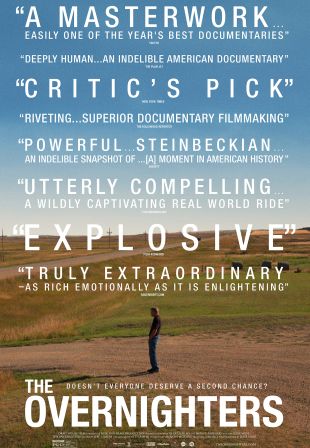
The Overnighters, an ambitious documentary about the plight of the working class directed, produced, and photographed by Jesse Moss, is one of the trickiest nonfiction films to emerge in quite some time. It's deceptive because of its unusual structure, which appears to be leading us down one thematic path before a last-minute revelation recolors everything preceding it.
Moss begins straightforwardly, with a curious backdrop. We learn that, while most of the country fell into an economic depression in the wake of the 2008 crash, the westernmost stretches of North Dakota flourished due to the proliferation of fracking rigs. Engineers used hydraulic pressure to penetrate an area called the Bakken region -- vast shale fields encompassing hundreds of thousands of square miles, which contain the largest oil reserves in the U.S. outside of Texas or Alaska. News of this discovery elicited an early 21st century equivalent of the gold rush: Thousands upon thousands of destitute blue-collar workers heard and heeded the call, and made a beeline for the vicinity of Williston, a working-class town of about 12,500 residents in North Dakota. Wages were as high as touted, with some frackers paid twenty dollars an hour or more, but the cost of decent lodging also shot through the roof. Consequently, those who began a new life in North Dakota as itinerants were forced to remain so.
The film opens in 2012. Witnessing the communal need that surrounds him, a Christian pastor named Jay Reinke launches an "overnighter program" at his congregation, the Concordia Lutheran Church. As hundreds of drillers take shelter there, Reinke and his staff soon become overwhelmed. There are the predictable complications -- a lack of space, trashed and polluted lawns, an obscene level of noise that vexes nearby residents. But then Reinke inherits an even graver debacle: a handful of men with arrest records a mile long, including histories of statutory rape. But in lieu of turning away these arrivals, Reinke knowingly offers them asylum, obscures their pasts, and even takes one documented sexual offender, a man named Keith Graves, into his personal home -- essentially making his wife and daughters vulnerable to the convict's actions. In time, the local press learns of the secrets harbored by Graves and the other overnighters, and reporters crack down on Reinke.
The average reader might ask why on earth an intelligent, educated 57-year-old man would ever take such a risk -- one that surpasses ignorance and arguably qualifies as lunacy. For roughly 90 of this film's 101 minutes, we may think we have it figured out: This seems to be a portrait of a kind but woefully naive minister who has stretched the concept of God's grace much too far. In many North American Protestant churches, there is a saying that goes, "Forgiving doesn't mean forgetting," and one guesses Reinke must have missed that one. For him, we reason, the two concepts are one and the same. The elusive question of where Christian compassion should begin and end in our modern era would be an involving enough topic to sustain this documentary by itself -- that is, if the story ended there.
But it isn't so simple. Reinke, we eventually learn, is one complicated and troubled soul. The concluding ten minutes are rife with revelations: They explain some of the enigmas at the core of the minister's life, and yet simultaneously raise dozens of thorny and unsettling conundrums in our minds -- about the events that have taken place off-camera, about Reinke's actual motives, about his capacities for cognitive dissonance and hypocrisy. Curiously, when the end credits finally roll, these uncertainties are an asset, not a liability. Because Moss revels in that space of ambiguity, what emerges in the final minutes is the same sort of exhilaration that many found from watching Andrew Jarecki's Capturing the Friedmans: Scenes and individual exchanges take on an eerie double meaning, and many viewers will want to go back and rewatch the material with augmented insight.
And all of this, of course, exists atop the social layer of the movie in which Moss intertwines the stories of several drillers and builds interest in their eventual fates. Over the course of this picture, heartbreak manifests in the lives of numerous workmen. Some are injured, some experience the fallout of separation from their families, and others are left homeless when room in the church is unavailable.
The whole film adds up to a damning portrait of working-class life and Middle American industry in the early 21st century, where promises of deliverance from financial destitution perpetually erupt into tragedy, on both individual and communal levels. The result is one of the saddest, yet most fascinating chronicles of recent times. Moss casts a discerning light on our era and its values, and has created a film that deserves to be remembered and discussed long beyond its initial festival and theatrical runs.
